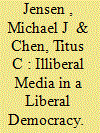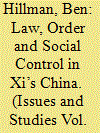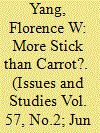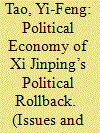| Srl | Item |
| 1 |
ID:
180527


|
|
|
|
|
| Summary/Abstract |
The regime of censorship in the People’s Republic of China (PRC) extends beyond its borders through the extraterritorial application of its media regulations to popular social media platforms like WeChat. This research investigates the effects of the PRC’s extraterritorial control of online content on the identity narratives and norms communicated by comparing Australia’s Special Broadcast Service (SBS) Mandarin language news and the news targeting Australian audiences published on popular WeChat Official Accounts (OAs). We find significant differences in the news content between these two platforms: SBS provides more political content and a focus on political and cultural integration, while WeChat pages tend to avoid political topics that are not otherwise press releases from the PRC and they encourage strong cultural ties with Mainland China. Finally, SBS tends to both inform and cultivate democratic political identities and identification with the Australian political system, whereas WeChat tends to differentiate the Chinese diaspora from the wider Australian community. We situate these findings within a wider understanding of PRC’s national security strategies and doctrine. Whether by requirement or practice, not only the WeChat OAs in Australia implement PRC’s communication controls, but the content on these pages also challenges the liberal democratic practices and norms and supports foreign influence and espionage in Australia.
|
|
|
|
|
|
|
|
|
|
|
|
|
|
|
|
| 2 |
ID:
180528


|
|
|
|
|
| Summary/Abstract |
In his first term (2012–2017), Xi Jinping’s signature domestic policy was an anti-corruption campaign that targeted political enemies and venality in public office. The anti-corruption work has continued in his second term while being superseded in domestic political importance by a campaign to “Sweep Away Black and Eliminate Evil (2018–2020).” On the surface, the campaign to Sweep Away Black and Eliminate Evil is an anti-crime campaign that focuses on the “black and evil forces” of organized crime and their official protectors, but its scope extends well beyond the ganglands to target a wide range of social and political threats to the Chinese Communist Party (CCP). Drawing on interviews with government officials, police and citizens as well as analysis of policy documents, this paper argues that the campaign is a populist initiative designed to bolster CCP legitimacy and serve as a mechanism of social control. Like the Chongqing prototype that inspired it, however, the campaign harbors a dark side that could undermine the contemporary Chinese social contract in which people are willing to sacrifice personal freedoms in exchange for security and material benefits.
|
|
|
|
|
|
|
|
|
|
|
|
|
|
|
|
| 3 |
ID:
180529


|
|
|
|
|
| Summary/Abstract |
After President Xi Jinping came to office, the Chinese government tightened its ideological control over establishment intellectuals and particularly the university teachers. This project aims to answer the question of why and when an authoritarian state chooses to do so. It focuses on the CCP’s policy toward establishment intellectuals under Xi and explores the most applicable explanation for this policy shift. Based on the existing literature on the cyclical model of state-intellectual relations in China, we propose a new model of “Dual Methods in State-Intellectual Relations.” The model demonstrates that the CCP has employed dual methods of repression and co-optation on intellectuals adopting different roles. Leaders choose repression when they perceive that the legitimacy of their rule is challenged externally or internally by criticism and collective actions led by intellectuals. In this case, the goal of repression is to either set up a new “red line” or warn intellectuals that they have crossed it.
|
|
|
|
|
|
|
|
|
|
|
|
|
|
|
|
| 4 |
ID:
180530


|
|
|
|
|
| Summary/Abstract |
When Xi Jinping had just come to power in 2012, the world expected that he would continue the development trajectory of economic liberalization and political institutionalization set in motion by Deng Xiaoping. However, when the National People’s Congress abolished the presidential term limit in the Chinese Constitution in March of 2018, it suddenly became clear that Xi had chosen to “roll back” from Deng’s policy line in nearly every aspect of the Chinese Party-state system. How does one explain Xi’s sudden departure from Deng’s policy line? In comparison with the resurgence of other authoritarian regimes of the 1960s and 1970s in Latin America and East Asia, this paper argues that the cause of Xi’s political rollback lies in the exhaustion of the previous development model. More specifically, the exhaustion of export-led growth in the mid-2000s had made the existing distributive coalition unsustainable. The power struggle within the political coalition therefore intensified and finally led to Xi’s monopoly over political power. The argument of this paper will proceed through four parts. It will begin with a literature review of comparative authoritarianism with a particular focus on the impact of a development crisis on the survival of political coalitions. It is followed by an analysis of the contributions of China’s export-led growth to the sustainability of the political coalition during the eras of Jiang Zemin and Hu Jintao. Then, it will explain how the exhaustion of export-led growth led to a power struggle within the political coalition and how through a re-orientation of the development model, Xi has gradually concentrated power into his own hands. Finally, it will discuss the theoretical implications of China’s case.
|
|
|
|
|
|
|
|
|
|
|
|
|
|
|
|